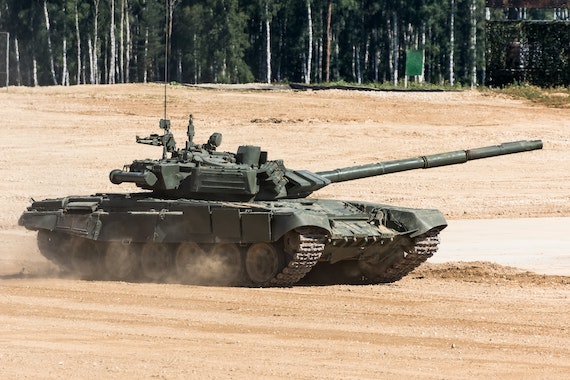Washington’s victory in Iraq did not liberate but imprisoned the country in warfare
( The Irish Times ) – The US war on Iraq, launched 20 years ago on Monday, became a significant turning point for the eastern Arab world due to the fall of a third key country from the regional front designed to secure the sovereignty and independence of the region. For decades, wars have felled Arab countries like dominoes, if not by design then by default.
The 1948 Israel-Arab war began this process. Arab governments and people responded to Israel’s occupation of 78 per cent of Palestine by pretending Israel did not exist and declaring it a no-go zone. Until then, Palestine had served as a land bridge between Egypt and the Levant, Iraq, Saudi Arabia and the Gulf.

Via Unsplash.
Israel’s 1967 conquest of the rest of Palestine forced the Arabs to forge ties with Palestinians living under occupation, but not with Israel. The 1973 war led to the 1978 peace treaty between Israel and Egypt, removed Egypt from the Arab politico-military alliance and denied Cairo Arab leadership.
The 2003 US war removed Iraq as a military and political force, stripped Baghdad of Arab stewardship, and set the region adrift. The Arab League, Arab goverments and citizens opposed George W Bush’s war, which was waged without UN authorisation by the US and Britain. backed by Australia and Poland.
French academic Dominique Reynie estimated 36 million people took part in 3,000 worldwide protests against the war. By contrast, in 1991 George H W Bush formed a 35-state coalition for the UN-authorised war to liberate Kuwait from Iraqi occupation. Saudi Arabia, Egypt, Syria, Morocco, Kuwait, Oman, the Emirates and Bahrain joined that coalition.
While the 1991 war was waged to free Kuwait, the casus belli for the 2003 war was three falsehoods: Iraq retained banned weapons of mass destruction (WMD); Iraqi president Saddam Hussein had ties to al-Qaeda, which attacked New York and Washington in 2001; and he posed a threat to the US.
The US lost Arab credibility when there was no WMD found – which had been eliminated by Iraq by December 1991. The Arabs never believed Saddam Hussein tolerated al-Qaeda’s presence in Iraq or intended to attack the US.
Casualties were greatly disproportionate, angering the Arabs. The US lost 4,480 soldiers and 3,400 contractors during the March 20th-May 1st war and its allies suffered 318 military deaths. Between 110,000-150,000 Iraqis were killed during the US-led attack and overall, there were one million conflict-related deaths, the US Rand organisation reported.
Many Iraqis left their country after the US occupation. Some 95 per cent remained in the region. According to the UN, 700,000 fled to Jordan and 1.2 million to Syria. Egypt, the Gulf Emirates, Saudi Arabia and Lebanon received tens of thousands. Iraq lost 40 per cent of its middle class.
Washington’s victory in Iraq did not liberate but imprisoned Iraq in warfare. After US viceroy L Paul Bremer III demobilised the Iraqi army, dismissed the civil service and outlawed the ousted Baath Party, soldiers and Baathists joined forces with al-Qaeda to mount an insurgency. Pro-Iranian Shia militias and the Iraqi nationalist Mahdi Army attacked US troops and Sunni communities until the US and Sunni allies put down the revolt in 2007-08.
Meanwhile al-Qaeda offspring Islamic State, also known as Isis, took root in Iraq and, after 2012, joined the conflict in neighbouring Syria where it established a caliphate, swept into Iraq, and ruled 40 per cent of the country until ousted in 2017.
Democracy promised by Bush produced a takeover by pro-Iranian Shia fundamentalist expatriates who returned to Iraq after the war. They benefited from the US-imposed sectarian system of governance, which has survived six flawed elections.
In October 2019, hundreds of thousands of Iraqis rose up to demand an end to sectarian rule. They argue it has fostered rampant corruption and impoverished oil-rich Iraq.
The Syrian civil and proxy war, Lebanon’s collapse, and the Saudi-Emirati war on Yemen have toppled three more countries of the depleted Arab front, leaving only Jordan and the six Gulf countries standing – with Saudi Arabia and the Emirates making policy. The Iraq War and its disastrous consequences have prompted them to scale down traditional reliance on the US and turn to Russia and China to restore relations with Tehran.
By normalising with Iran, they seek to reduce regional tensions and prevent potential Israeli-US military strikes against Iran’s nuclear facilities, which could provoke Tehran to retaliate against the Gulf states.
Reprinted with the author’s permission from The Irish Times

:quality(70)/s3.amazonaws.com/arc-authors/irishtimes/0eb3e327-5942-4e5d-b411-e46e6f139e09.png)

 © 2026 All Rights Reserved
© 2026 All Rights Reserved